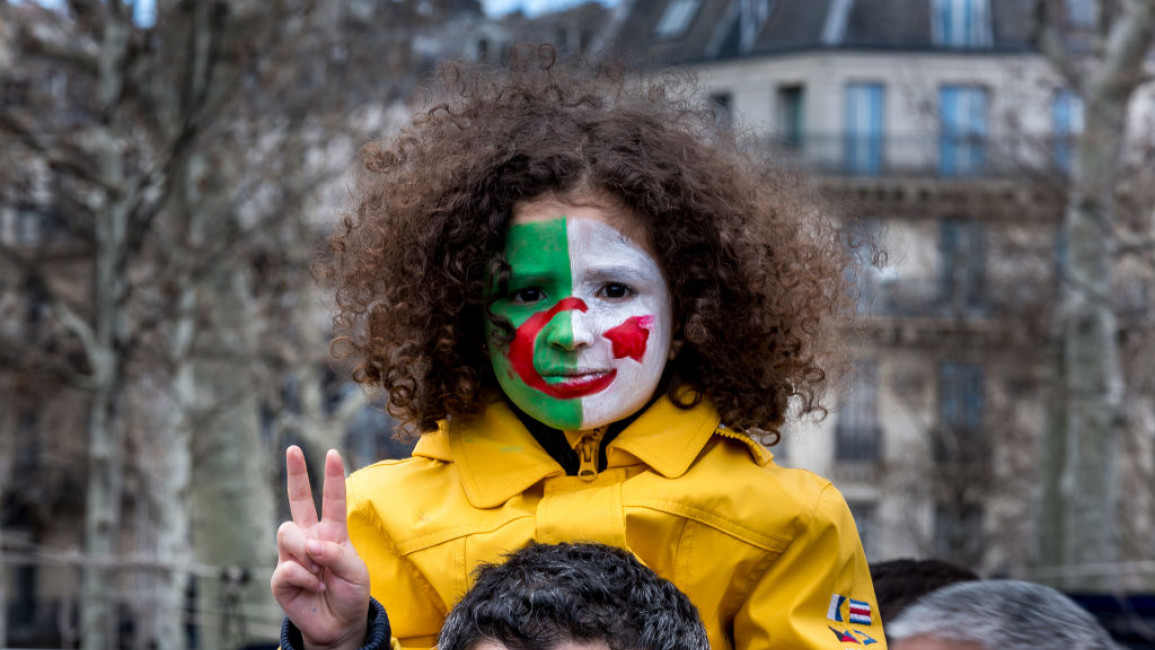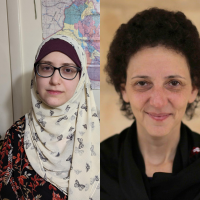
Telling our own stories: How Algeria’s independence empowered its diaspora in France
On 5 July, Algeria celebrated its 60 years of Independence from France after a barbarous eight-year war and 132 years of colonisation. Algerians around the world paid tribute, on this day, to those who sacrificed their lives for freedom. In France, the Algerian war remains a tricky topic to address and a point of tension between the two countries as the French government sticks to its, “no apologies, no reparations” policy.
What additionally has not helped the process, is the romanticisation of the colonial period, or as Emmanuel Macron depicted it during his last official visit to Algeria in late August: "a love story which has its share of tragedy."
As a French-Algerian who is strongly attached to her roots, this anniversary was stressful to even think about, because I knew it would mean more denial, more revisionism and more pointless and unproductive debates among French commentators and political leaders. It happens every year, with every political event, and 2022 was no exception, especially given the presidential elections had also taken place.
''We sought to tell our stories to whoever would be willing to listen, on our own terms, with experts, filmmakers, journalists and authors, who are rarely seen on mainstream media platforms but who shared our vision for the project. It was also a way to feel connected to our parents’ homeland, and for some of us, to our place of birth.''
On example came from Les Républicains’ presidential candidate, Valérie Pécresse, who during a radio interview, said that there were “good” and “bad” things about colonisation. It was hurtful and frankly enraging to hear such historical falsehoods.
The left of the French political spectrum felt like it was no better. They seemed to unanimously support such a discourse. The president’s comments over the summer, that compared the horrific plunder and killing of hundreds of thousands under colonisation, to a tragic love story, only reinforced the problematic views.
If the shared chapter in France and Algeria’s histories qualifies as a love story, it is an abusive and toxic one.
Our history will not be hijacked
As the date approached, there was a collective sense of silencing. Our voices as the young Algerian diaspora, as well as those of our elders, were strikingly missing. If we were invited to the conversation – which rarely happened – it was a very brief contribution with barely any nuance or elaboration.
A collective from the community refused to just sit by and allow the hijacking of our history once again. We owed it to our past, to our parents and to ourselves to take action. Therefore, over the summer, eight diverse French and North-African women, bound by a desire to shift the narrative, came together to organise Raconter l’Algérie (Recount Algeria), an event to pay tribute to the independence anniversary and shed a light on our heritage.
We sought to tell our stories to whoever would be willing to listen, on our own terms, with experts, filmmakers, journalists and authors, who are rarely seen on mainstream media platforms but who shared our vision for the project. It was also a way to feel connected to our parents’ homeland, and for some of us, to our place of birth.
Raconter l’Algérie opened up discussions on music, literature, cinema, and the reality of the Algerian war. Attendees also sang to the top of their lungs during Algerian karaoke, and danced the night away as celebrated artists Médine and Tif gave mind-blowing performances.
Whilst the event was stressful and exhausting to plan and host, organisers never felt more at peace and armed with a sense of purpose.
This event highlighted something unexpected. As Vintage Arab’s playlist blasted from la Flèche d’Or, everyone slowly let go of the fears of judgement, and we were unapologetically ourselves.
For the first time in a long time (or at all for some of us), we didn’t need to adjust to what was perceived to be the norm in France, to wear a social mask, to fake it to fit in. We were connecting to our roots and to each other. We were free, from the horrid and humiliating daily stereotypes and we didn’t need to justify our presence.
Des débats passionnants, mais aussi des concerts de feu - toujours aussi fan de @Medinrecords, beaucoup d’amour pour @thetif_ et @YoonOnTheMoon.
— Khedidja Zerouali (@khedidjabe) July 3, 2022
Bravo aux organisatrices de «Raconter l’Algerie», quel plaisir de voir des meufs indépendantes monter de si beaux projets. Mashallah++ pic.twitter.com/FHReGToq7W
As a diaspora kid, born and raised in France, I’ve never felt as free and joyful in this country as I did that night. Raconter l’Algérie empowered us to continue organising events, and through this process create safe spaces for our diverse communities – not just the Algerian diaspora. Following the overwhelming support for the event, we set up the Arabengers collective, comprised of the organisers, including: myself, Ouafae Mameche, Lina Soualem, Nadia Bouchenni, Fatma Torkhani, Hajer Ben Boubaker, Farah Khodja, and Dorothée-Myriam Kellou. We did so with the conviction that we would never be silenced again.
With the 1st of November upon us - an anniversary which marks the start of the Algerian war of liberation - these same political questions and the denial of colonialism deeply rooted in the French society, feel inevitable. This is why spaces that Arabengers and others seek to provide, which inspire individuals and entire communities to take back their narratives and agency in a society filled with oppression, are so vital.
In France, the Algerian war became the battlefield of narratives which for too long the diaspora was losing, now is the time to claim our truth.
Donia Ismail is a French Algerian-Egyptian journalist and deputy editor-in-chief of Arabia Vox. She’s the producer of Allô 213? podcast, winner of the Paris Podcast Festival 2022, which focuses on Algeria. In 2022, she joined the collective Arabengers which sheds a light on the Arab diaspora in France.
Have questions or comments? Email us at: editorial-english@newarab.com
Opinions expressed here are the author's own, and do not necessarily reflect those of their employer, or of The New Arab and its editorial board or staff.



